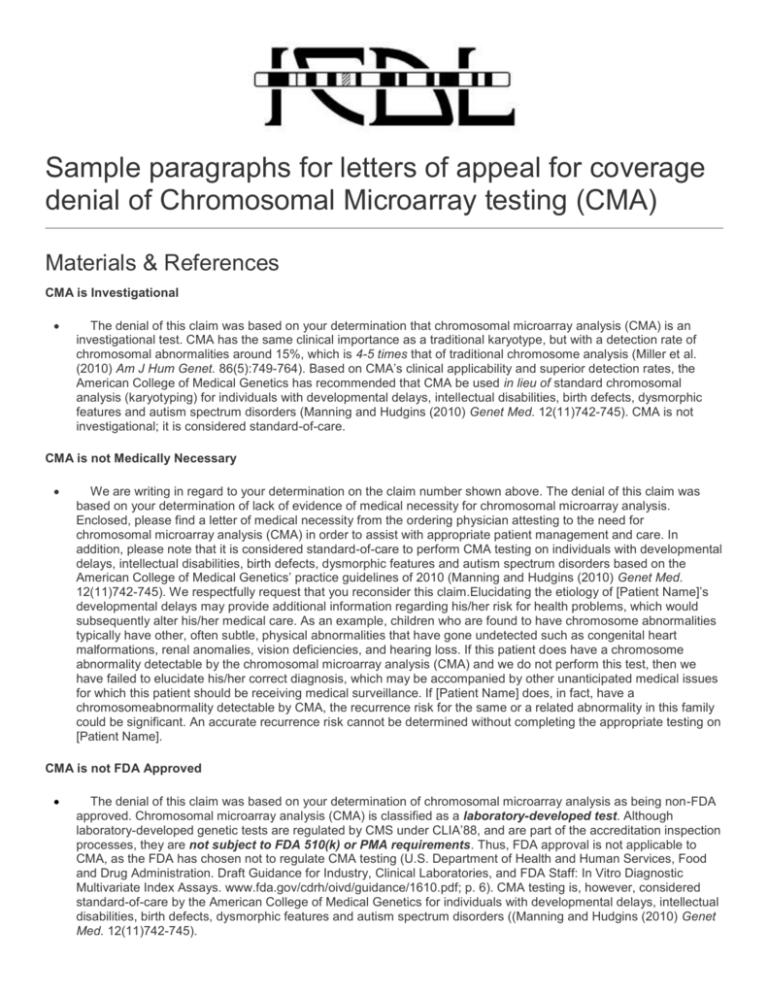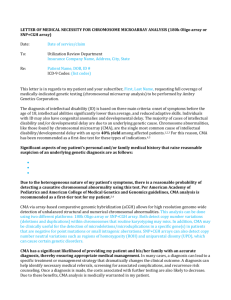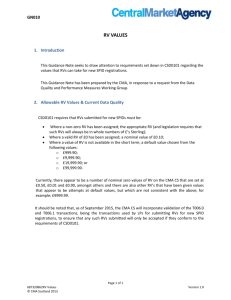4. Sample paragraphs for letters of appeal for coverage denial
advertisement

Sample paragraphs for letters of appeal for coverage denial of Chromosomal Microarray testing (CMA) Materials & References CMA is Investigational The denial of this claim was based on your determination that chromosomal microarray analysis (CMA) is an investigational test. CMA has the same clinical importance as a traditional karyotype, but with a detection rate of chromosomal abnormalities around 15%, which is 4-5 times that of traditional chromosome analysis (Miller et al. (2010) Am J Hum Genet. 86(5):749-764). Based on CMA’s clinical applicability and superior detection rates, the American College of Medical Genetics has recommended that CMA be used in lieu of standard chromosomal analysis (karyotyping) for individuals with developmental delays, intellectual disabilities, birth defects, dysmorphic features and autism spectrum disorders (Manning and Hudgins (2010) Genet Med. 12(11)742-745). CMA is not investigational; it is considered standard-of-care. CMA is not Medically Necessary We are writing in regard to your determination on the claim number shown above. The denial of this claim was based on your determination of lack of evidence of medical necessity for chromosomal microarray analysis. Enclosed, please find a letter of medical necessity from the ordering physician attesting to the need for chromosomal microarray analysis (CMA) in order to assist with appropriate patient management and care. In addition, please note that it is considered standard-of-care to perform CMA testing on individuals with developmental delays, intellectual disabilities, birth defects, dysmorphic features and autism spectrum disorders based on the American College of Medical Genetics’ practice guidelines of 2010 (Manning and Hudgins (2010) Genet Med. 12(11)742-745). We respectfully request that you reconsider this claim.Elucidating the etiology of [Patient Name]’s developmental delays may provide additional information regarding his/her risk for health problems, which would subsequently alter his/her medical care. As an example, children who are found to have chromosome abnormalities typically have other, often subtle, physical abnormalities that have gone undetected such as congenital heart malformations, renal anomalies, vision deficiencies, and hearing loss. If this patient does have a chromosome abnormality detectable by the chromosomal microarray analysis (CMA) and we do not perform this test, then we have failed to elucidate his/her correct diagnosis, which may be accompanied by other unanticipated medical issues for which this patient should be receiving medical surveillance. If [Patient Name] does, in fact, have a chromosomeabnormality detectable by CMA, the recurrence risk for the same or a related abnormality in this family could be significant. An accurate recurrence risk cannot be determined without completing the appropriate testing on [Patient Name]. CMA is not FDA Approved The denial of this claim was based on your determination of chromosomal microarray analysis as being non-FDA approved. Chromosomal microarray analysis (CMA) is classified as a laboratory-developed test. Although laboratory-developed genetic tests are regulated by CMS under CLIA’88, and are part of the accreditation inspection processes, they are not subject to FDA 510(k) or PMA requirements. Thus, FDA approval is not applicable to CMA, as the FDA has chosen not to regulate CMA testing (U.S. Department of Health and Human Services, Food and Drug Administration. Draft Guidance for Industry, Clinical Laboratories, and FDA Staff: In Vitro Diagnostic Multivariate Index Assays. www.fda.gov/cdrh/oivd/guidance/1610.pdf; p. 6). CMA testing is, however, considered standard-of-care by the American College of Medical Genetics for individuals with developmental delays, intellectual disabilities, birth defects, dysmorphic features and autism spectrum disorders ((Manning and Hudgins (2010) Genet Med. 12(11)742-745).



![[Date] - Quest Diagnostics](http://s3.studylib.net/store/data/005839747_1-f7115239afa724b4c691b917d7e402b8-300x300.png)

